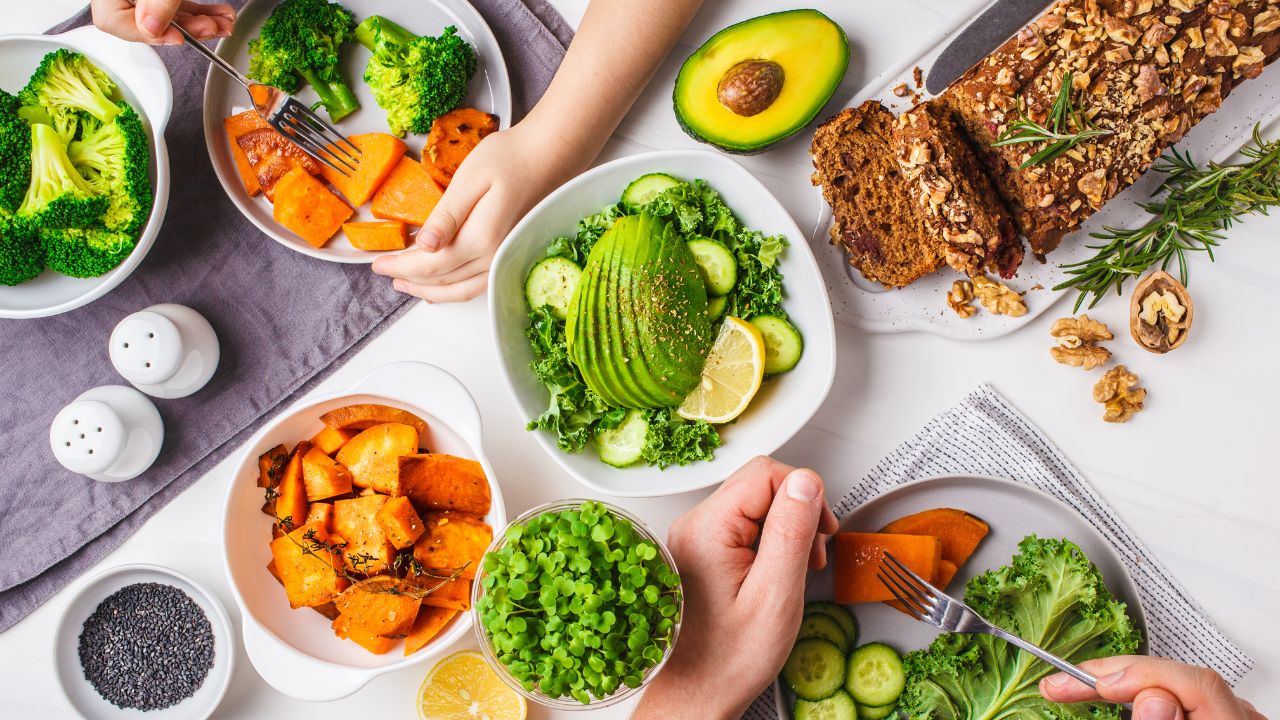For most of my life, I was a typical carnivore, and I ate a diet that included red meat, white meat, fish, eggs, and dairy, in addition to vegetables and fruits. When I decided to drop meat and only eat fish, eggs, dairy, veggies, and fruits, I didn’t know that this was but one of many types of available vegetarian diets.
My diet lies somewhere between what would be considered as lacto ovo vegetarian and pesco vegetarian. Confused?
That’s right, several vegetarian diet types are available, and each has a name based on what the diet includes.
Before we dive into the statistics of just how many people have converted to a vegetarian type of diet, let’s see just what this could include:
- Vegans — People who eat no animal products such as meat, milk, poultry, cheese, eggs, fish, or honey.
- Lacto Vegetarians — People who don’t eat meat, poultry, fish, or eggs but will still use dairy products.
- Lacto-Ovo Vegetarians — People who don’t eat meat, honey, fish, or poultry but will consume eggs and dairy products.
- Ovo Vegetarians — Those who eat eggs but refrain from all other animal products such as meat, milk, fish, poultry, or honey.
- Pesco Vegetarians (Pescatarians) — Those who will eat fish but no other sources of meat or dairy.
- Pollo Vegetarians — People who can consume poultry but refuse red meat consumption.
Now you know just how many diverse plant-based diets are around, and we’re not even talking about the more delicate ones like fruitarians or insectarians (#BiteThatBug), it’s time to check out some interesting statistics on vegetarians.
Most Astonishing Stats at a Glance
- There Are Almost 1.5 Billion Vegetarians Worldwide
- In 2025, 25.8 People Worldwide Tried Veganism
- Plant-Based Food Market Crossed Sales Worth $9.87 Billion in the US in 2024
- 22% of the Global Population Is Vegetarian
- In Europe, Almost 3.4% of the Population Is Vegan
- 31 to 42% of the Indian Population Is Vegetarian
- Almost 8 Million Adults in the US Don’t Consume Meat
- Shifting to a vegetarian diet can Reduce 75% of Global Agricultural Land
- Vegetarians Have 45% Less Risk of Cancer
Vegetarian Statistics

According to the latest Stats, there are 1.5 billion vegetarians around the globe. (British Council)
For some, meat is too expensive or simply not available, which may prompt them to follow a vegetarian diet. Other vegetarians choose the vegan or vegetarian diet due to a moral factor or taste preferences. (source)
Worldwide, there are over 1.5 billion vegetarians, of which 75 million are vegetarians by choice and around 88 million vegans in the world.
Based on YouGov survey data and current population figures, an estimated 25.8 million people around the world decided to try a vegan diet in January 2025.
6% of the population is Vegetarian and 4% vegan in the US, which is approximately 20.2 million and 13.46 million people, respectively, and the total population is 336.67 million. (Statista)
People have been choosing to live a vegetarian lifestyle for many centuries. Monks and other spiritual leaders have often lived without eating meat or partaking in animal slaughter. In our modern world, some people have changed to vegetarianism for dietary preferences, health benefits, and more. (source)
5% of Vegetarians Are Female in the US (VRG)
American women prefer a vegetarian lifestyle, and 5% of vegans are women, which indicates that women are more predisposed toward vegetarian diets. (source)
54% of US Citizens Eat Vegetarian Food When They Dine Out (VRG)
Surprisingly, more people who aren’t vegetarians in their day-to-day lifestyles are ordering vegetarian food when they eat out, to the tune of 54% of Americans. Just think of those yummy, refried bean tacos you order. (source)
Plant-Based Food Market Crossed Sales Worth $9.87 Billion in the US in 2024. (Research and Markets)
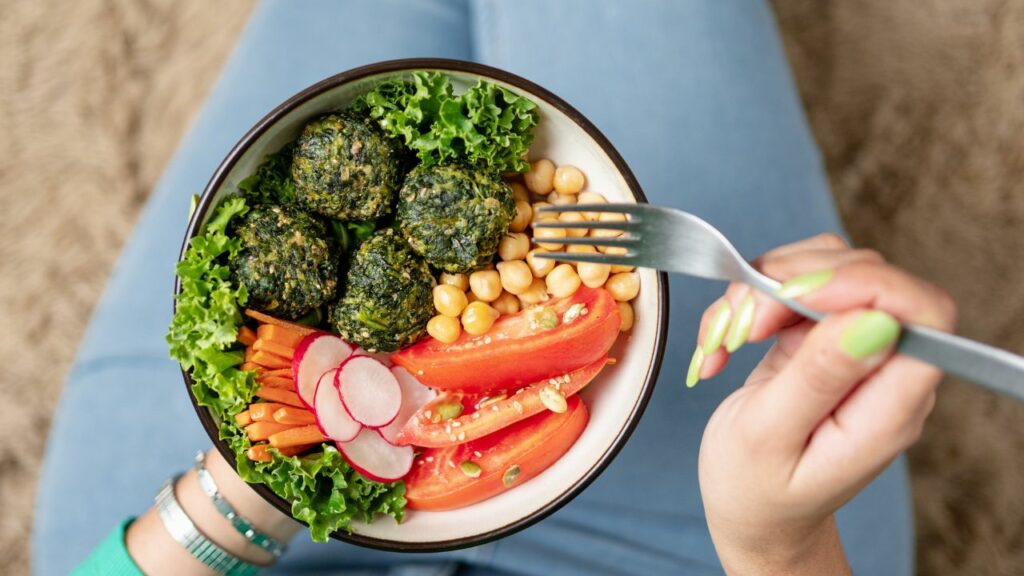
In 2024, plant-based food dollar sales reached $9.87 billion. Plant based food market is expected to reach US$ 26.72 billion in 2033, with a CAGR of 11.70 % from 2025 to 2033.
The strong growth of the market is driven by more people choosing vegetarian lifestyles, increasing interest in sustainable and cruelty-free food options, and the wider availability of unique vegan products sold online. (source)
According to Stats for 2022, India had the Highest Vegan Share of 13% (Statista Consumer Insights)
Due to its Tamil and Hindu religious convictions, India has a higher-than-average share of the vegetarian market. Additionally, India is an impoverished country, so many of the population can’t afford meat and rely on plant-based foods. India scoops the mash with 13% of the vegan diet market share.
What Percent of the World Are Vegetarian

22% of the Global Population Is Vegetarian (The Research Gate)
There are vegetarians in most countries, but did you know that 22% of the world’s population is vegetarian? This number is also growing. (source)
Despite the demand for meat increasing by 250% in the last half-century, the number of vegetarians has increased dramatically.
In 2025, 25.8 million People Worldwide Signed Up for Veganuary (Veganuary)
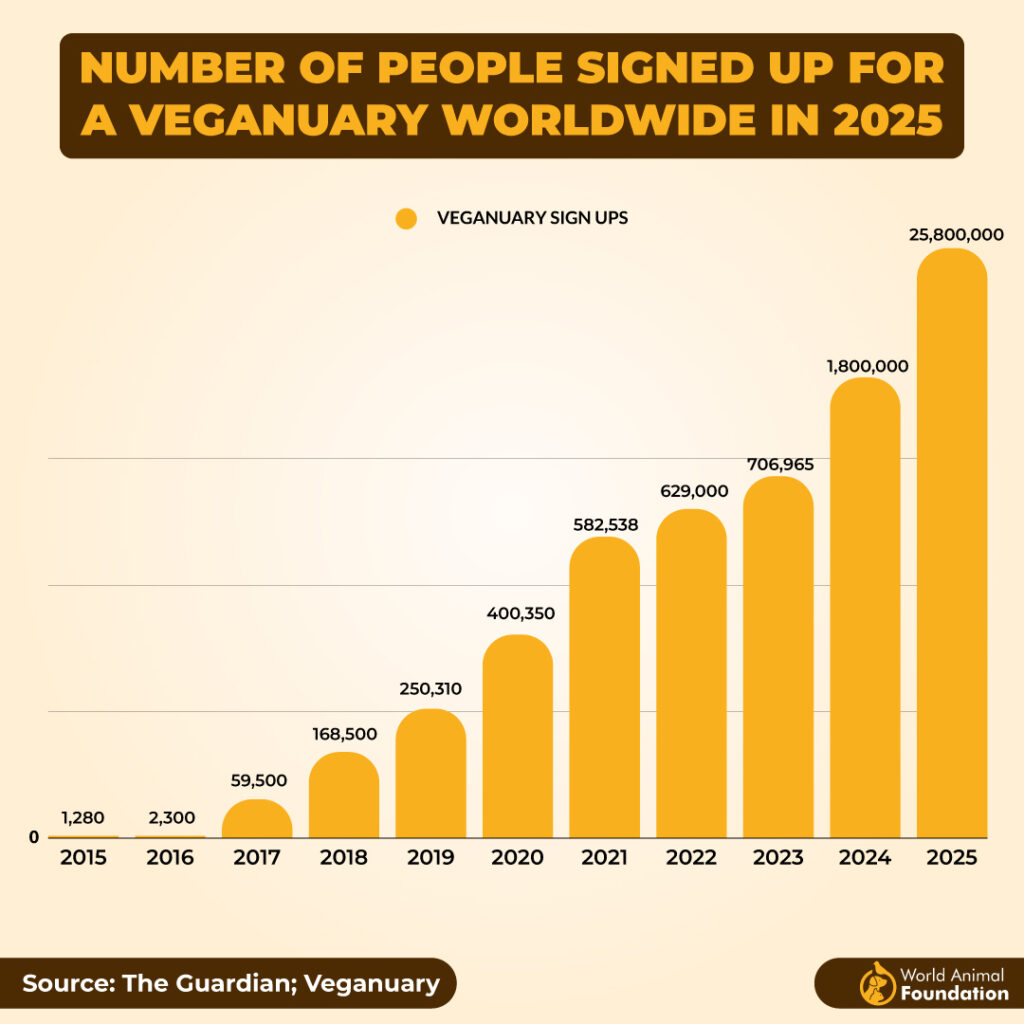
In January 2025, 25.8 million people worldwide attempted to adopt a vegan lifestyle. This month, more than 1,480 new vegan products were placed on the shelves, while restaurants added over 75 new vegan meal options. 228 organizations took part in the Workplace Challenge around the world. (source)
Black adults are about twice as likely to follow a vegetarian diet compared to White adults. (VRG)
While black Americans throw a curveball by being as much as two times more likely to become vegetarians than other American demographic groups. In fact, VRG reported that 8% of black Americans are vegetarian or follow a vegan diet compared to just 4% of white (non-Hispanic) adults.
The health benefits of being vegetarian or following a vegan diet appeal to black Americans, as it helps manage health conditions like high blood pressure and diabetes, which black Americans are prone to.
The Fastest-Growing Vegan Population in the US Is African Americans (Humane League)

To believe that being vegan is a white or European idea is misinformed, as many African cultures have a long history of veganism. Because African Americans are learning more about their roots and their cultures, they are discovering veganism.
Rastafarianism and Islam appeal to a large percentage of the African-American population, and being a “rasta” comes with respect for life and not eating animal products. Being Muslim doesn’t mean you must be vegan, but many Muslims prefer to follow a vegan diet when they can’t source Halal food.
31 to 42% of the Indian Population Is Vegetarian (Rferl)
India leads the vegetarian charge, with almost 42% of the population following vegetarian diets either full-time or seasonally. (source)
Approximately a Quarter of Indians Follow a Vegetarian Lifestyle (Statista Consumer Insights)
Of India’s population, Indians who are vegetarians constitute about a quarter of the population. Other members of the Indian population may not consume meat daily, which may not rank them as vegetarian (other than being Pollo vegetarians).
However, many Indians have a month of fasting, where they don’t eat meat for religious reasons, which means more people would be vegetarian during those months.
4-5% of China’s Population Identify as Vegetarian or Vegan (CBBC)

It’s difficult to determine the exact number of vegan and vegetarian diners in China. However, some estimates suggest that around 4–5% of the population follows a vegetarian or vegan diet. With China’s population exceeding 1.4 billion, that would equal roughly 56 to 70 million people. (source)
9.5% of Brits are planning to follow a vegetarian diet in 2026 (Finder)
According to a Finder survey, 9.5% of people in the UK plan to follow a vegetarian diet in 2026 — about 5.2 million individuals. This figure includes 5.5% who are already vegetarian (around 3 million people) and another 4% who say they intend to adopt a vegetarian diet this year (approximately 2.2 million people). (source)
In 2023, Almost 8.12 Million People in Germany Classified Themselves As Vegetarians (AWA)
Over the last two years, Germans have avoided their “wurst” and other meat-based dietary choices. However, 8.12 million Germans have classified themselves as either vegetarians or those who have largely forgo meat. About 1 in 10 Germans identify as vegetarian or vegan.
Meat alternatives are said to increase in market weight to 100 pounds per person on average.
14% of people followed a meat-free diet at the end of 2025, compared to 12% at the end of 2024 (Finder)
By the end of 2025, 14% of people in the UK were following a meat-free diet — around 7.7 million individuals. This marks an increase from 12% at the end of 2024.
You can also learn about US meat consumption here.
In 2021, a survey conducted by Euromonitor International found that 3.4% of Europeans reported adhering to a vegan diet. (Euromonitor International)
In 2021, 11.1% of Europeans said they followed a flexitarian diet, while 23% reported limiting their meat intake. Additionally, 3.4% indicated they were vegan. (source)
According to Different Surveys, almost 5 to 8% of US Adults Consider Themselves Vegetarians (GALLUP, Forbes)

Many Americans (23%) have been recorded as eating less meat, with 5% that consider themselves vegetarian. (source)
Forbes found that as much as 8% of Americans are either vegetarian or follow a vegan diet (5% and 3%, respectively).
Vegetarian Market
In 2025, the revenue in the Meat Substitutes market totals US$7.87 billion. (FBI)
The global meat substitutes market was worth $7.87 billion in 2025. It is expected to grow from $8.63 billion in 2026 to $20.7 billion by 2034. In 2025, Europe led the market, holding a 42.08% share of the total market. (source)
The U.S. market for milk substitutes exceeds the meat substitutes market by 3.86 billion U.S. dollars. (Statista)
The Milk Substitutes market is projected to reach 1.27 billion kg by 2028. Volume growth is expected to be 4.8% in 2025. (source)
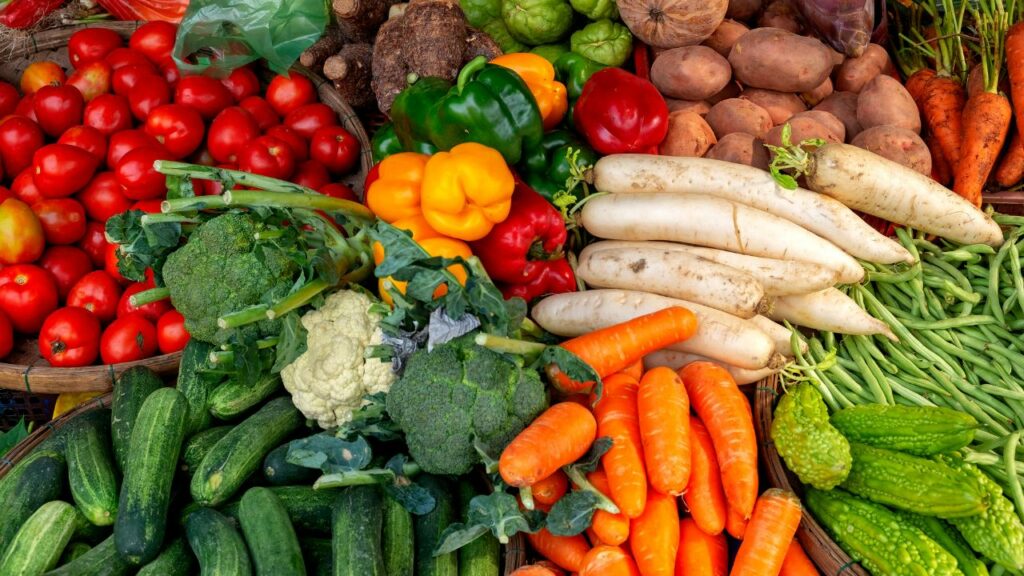
In 2024, the Plant-Based Food made up 1.1% of total retail food and beverage dollar sales (GFI)
In 2024, the U.S. retail market for plant-based foods was valued at $8.1 billion. Compared to 2023, unit sales fell by 5%, and total sales revenue dropped by 4%. Overall, plant-based foods accounted for 1.1% of total retail food and beverage sales in 2024. (source)
Factors responsible for this are the increase in the number of people who alternate between meat meals and plant-based meals. The rising cost of meat has also made vegetarian food more price-friendly.
People in the UK spent £898 million in 2025 on Meat-Free Food Products (GFI Europe)
If you’re wondering whether the plant-based food sales boom can continue, the answer is yes. While the meat market is still substantially bigger than the plant-based dietary market, the continued rise in sales of vegetarian food is likely to continue growing as meat sales shrink.
The total annual sales across six plant-based categories reached £898 million in the year ending January 2025. This was 4.5% lower than the previous year and 3.4% lower than the year ending January 2023. (source)
Vegetarian product sales in the UK reached an estimated £141 billion, marking significant growth in 2023. (EC Market)
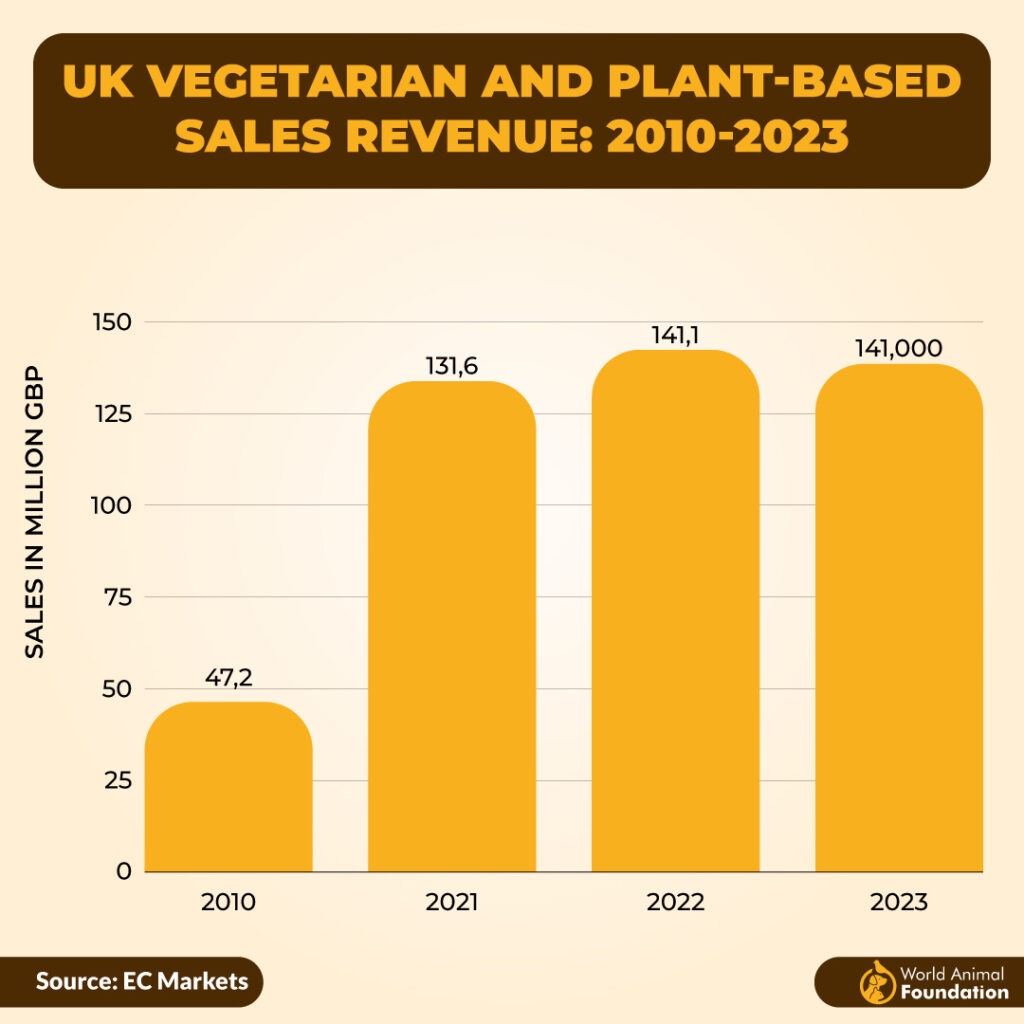
There is growing health awareness, raising interest in plant-based diets, and concern about the environmental impact of animal agriculture. Furthermore, the influence of cultural and ethical factors cannot be overlooked. (source)
Vegetarians Vs. Meat Eaters

As a vegetarian, I don’t judge my friends who are meat eaters. All do not always share my concerns over the environment and animal rights, but there are health benefits to following a vegetarian or vegan diet.
A Study in 2021 compared the Cost of plant-based and Meat Based Diet in 150 Countries and Showed by following a Plant-Based Diet, Consumers Can Cut Their Food Bills by One-Third (The Lancet)
The Lancet’s study published that changing from a meat-rich diet to a vegan diet can cut your meal costs by a third. That’s a huge saving for me, and I have found my meals to be much more budget-friendly since I became a vegetarian. (source)
Vegetarians Have 45% Less Risk of Cancer (AJCN)
The Adventist Health Study has found that those who follow vegetarian or vegan diets are 45% less likely to develop certain forms of cancer than those eating meat as part of their daily diet. Research showed a lower risk for certain types of cancer, including breast, colorectal, prostate, stomach, and some lymphoproliferative cancers. (source)
A Study Conducted in 2016 Showed People Who Followed a Vegan Diet Experienced a 35% Lower Risk of Prostate Cancer (NCBI)
The benefits of a vegan diet for cancer risk reduction are as much as 35% due to vegan diets being richer in nutrients and beneficial for better overall health, contributing to a reduction of cancer risk factors.
With prostate cancer accounting for 27% of cancer incidents among male subjects, the decrease in prostate cancers is significant. (source)
There Is a Significantly Low Prevalence of Type 2 Diabetes in People Who Follow a Plant-Based Diet (Springer Nature)
Following plant-focused diets — especially the Planetary Health Diet or the DASH diet — can lower the risk of type 2 diabetes by 30–43%. These benefits come from eating more vegetables, whole grains, and fish, while reducing red meat and sugar intake. (source)
A Study Conducted at Oxford University Revealed Vegetarian Diet Is Comparatively Cheaper Than a Meat Diet (University of Oxford)
Oxford University’s study found that vegetarian or vegan dietary preferences are more affordable than those favoring meat consumption. However, a diet that contains fish, such as a pescatarian diet, had a 2% increase in cost. (source)
A Study Showed Vegetarians Experienced a 17-24% Lower Risk of Dying Due to Cardiovascular Diseases Compared to Meat Eaters (ACC)
The study used data from UK Biobank, NHANES, and CLHLS, including nearly 78,000 people with heart and metabolic conditions, to examine the impact of diet quality.
Overall, people who closely followed a healthy plant-based diet had a 17% to 24% lower risk of dying from any cause, heart disease, or cancer. In contrast, those who followed an unhealthy plant-based diet had a 28% to 36% higher risk of death from any cause, heart disease, or cancer. (source)
Benefits of Eating Meat Vs. Vegetarian

A Study Conducted in the UK on 10,000 Participants Showed Vegetarians Are Twice More Likely To Develop Depression and Anxiety (Journal of Affective Disorders)
While vegans are less likely to develop cancer, they are twice as likely to develop depression and anxiety as those who follow meat-based diets. (source)
Now, before you put aside your super-sized beef burger to gloat, the main reason for the increase in depression is when vegans or vegetarians follow a diet that’s not balanced with enough B vitamins.
Being vegan is healthy, but it comes with the burden of eating a broad spectrum of foods to prevent deficiencies resulting from a drop in B vitamins and iron intake.
50% of Vegans and 7% of the Vegetarian Diet are Deficient in Vitamin B12 (Journal of Affective Disorders; MedicalXpress)
Vegans are less likely to get enough iron and vitamin B12 from a plant-based diet than vegetarians and meat eaters.
50% of vegans tend toward a vitamin B12 deficiency and an increased inflammation count due to the increased intake of omega-6 from eating nuts. (source)
In contrast, vegetarians, who may eat meat or animal products such as salmon and eggs, are less likely to contract mental health conditions triggered by vitamin B12 deficiency.
An Elevated Risk of Allergies Is Associated With a Vegetarian Diet (NCBI)
While vegetarian or vegan dietary preferences are considered healthier, some risks may affect your predisposition to allergies and mental health conditions if your diet is not balanced and rich in B vitamins or lacks certain minerals. (source)
Impact of Vegetarianism on the Environment
According to the National Food Strategy Report of 2021, We Should Be Consuming Less Meat by 2030 (National Food Strategy Report)
With people consuming more and more meat in some countries and with the continued growth in the human population, there is an increasing demand for animal sources of protein.
However, raising more animals comes with the burden of increased methane production, damage to water sources, and a drain on natural resources such as farmland, water, and oxygen.
To curb this, we must rethink how we eat and our reliance on meat. According to the WHO report on meats if we don’t cut back on how much meat we consume by 2030, we are likely to cause irreparable damage to the environment.
A 30% Reduction Equals Just 2 Meat-Free Days in a Week (Sky News)
If you believe you can’t go without your bacon and egg and hamburgers each week, consider that a reduction of 30% is as easy as having two meat-free days per week—and that’s doable. (source)
The benefits of following a partial meat diet instead of a complete carnivore diet include a better environment, less animal cruelty from the factory farming industry, and improved health—it sounds like a win-win to me.
By switching to a Vegetarian Diet, a 75% Reduction in the Global Agricultural Land Would Be Achieved (Our World in Data)

To produce more and more meat (because animal farms require more space for grazing and for supporting farms that grow corn and produce hay), we have engaged in a destructive program of deforestation, cutting down huge chunks of natural forests to make room for cows, sheep, and pigs.
By becoming partially vegetarian, we can reduce the need for farmland by 75%. Instead of needing 4 billion hectares to keep animals, we can grow enough food to sustain the human race on 1 billion hectares. (source)
70 times less greenhouse gas is produced by plant-based proteins than an equivalent amount of beef, and it also consumes 150 times less land. (National Food Strategy Report)
Vegetarian meat alternative produce requires 150 times less land and less water to grow. Likewise, plants produce oxygen, not methane. So, growing plants as protein sources instead of relying on cows will cut methane production by 70 times. (source)
In Europe, Almost 3.2% of the Population Is Vegan (The Vegan Society)
Europe, despite being composed of many different countries, is not a highly vegetarian continent, with only 3.2% of its population following a vegan lifestyle.
Europe’s relatively low percentage of vegetarianism can be attributed to a variety of cultural, historical, and dietary factors.
While the overall percentage of vegetarians may be relatively low, certain regions or cities within Europe may have higher concentrations of vegetarians and vegans due to factors such as education, urbanization, and accessibility to plant-based options.
Vegetarians in the US

I wondered about vegetarians in the US, and these were some prominent statistics.
According to the Latest Study, There are 9.7 Million Vegetarians in the US (Vegconomist)
The study indicating 9.7 million vegetarians in the U.S., as reported by Vegconomist, highlights a significant trend, but it’s important to remember that statistics can vary across different sources and methods.
Almost 8 Million Adults in the US Don’t Consume Meat, Among Which 3.7 Million Are Also Vegans (VRG)
3.3% of all adult Americans self-report (in a Harris Poll) as being vegetarian, which translates into 8 million adults. Of the eight million vegetarians, 3.7 million people reported as being vegan and ate no animal products. (source)
Approximately 22.8 Million People in the US Follow a Vegetarian-Inclined Diet (Vegetarian Times)
10% of Americans follow a largely vegetarian diet, which is 22.8 million people. I know that my friends tend to prefer ordering vegetarian dishes when we eat out. (source)
The US has a Total Vegan Share of 4% (Statista Consumer Insights)
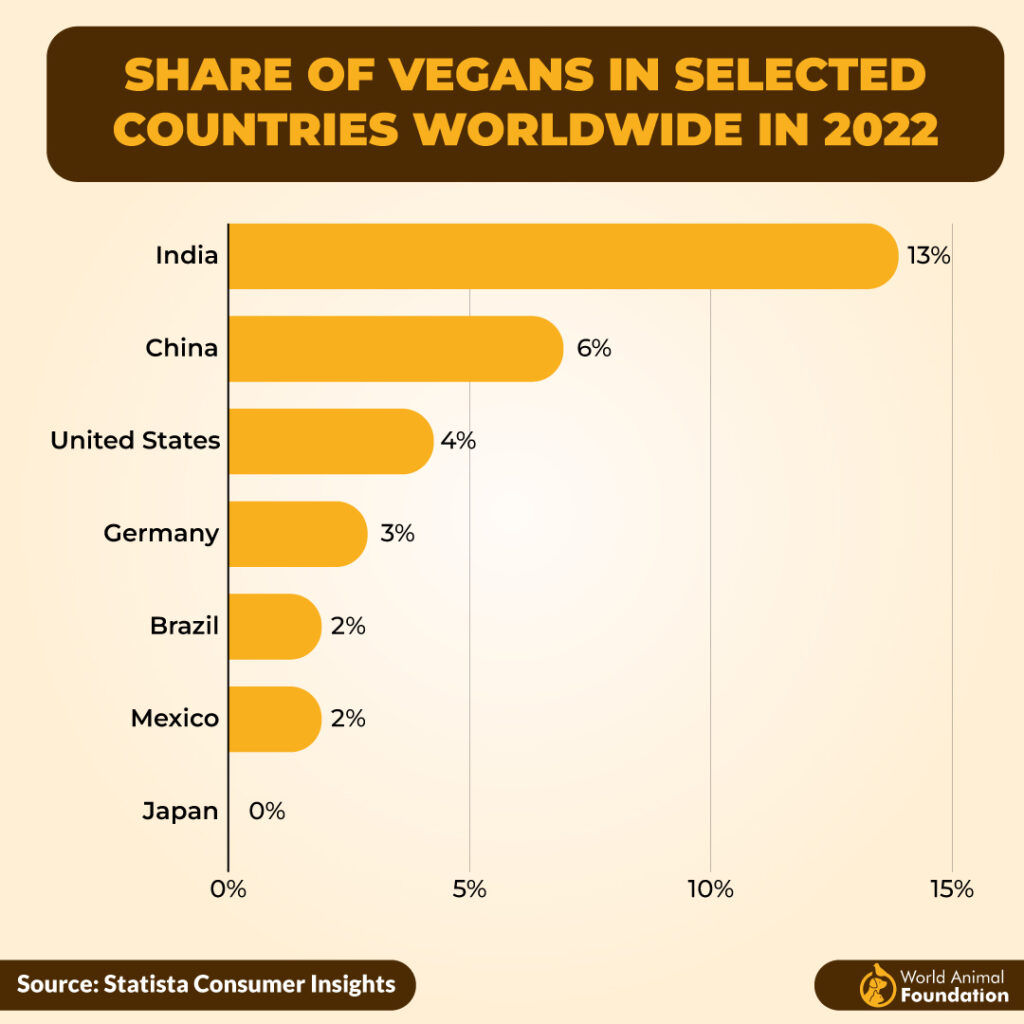
Choosing vegetarian meals is about 4% of the global market when considering vegetarians in America. Vegetarian dishes are being served in American restaurants more often, which has helped increase the move to veganism.
Vegetarian Facts
My friends often ask me my reasons for becoming a vegetarian, and I like to share some interesting facts about vegetarians.
- Vegetarianism is as old as Plato and the earliest philosophers who already theorized that animal flesh isn’t as healthy.
- People become vegetarians due to moral choices to save on living costs, animal rights, conservation efforts, and health benefits.
- The most popular type of vegetarianism is lacto-ovo vegetarianism.
FAQ’s
How many people are vegan in the world?
A 2018 survey estimated that around 230 million people, or 3% of the global population, are vegan. However, the VOU reports a significantly lower figure, stating that 88 million people, or 1% of the world’s population, follow a vegan diet.
What percentage of Indians are vegetarian?
India leads the world in vegetarianism, with nearly 42% of the population following vegetarian diets either full-time or seasonally.
Do vegetarians eat meat?
A vegetarian diet excludes all meat and seafood. However, there are variations: some vegetarians consume eggs and dairy products, while others avoid one or both.
What Are the Plant-Based Protein Alternatives?
Soy is the main protein alternative, but there are other alternatives, such as mushrooms, nuts, grains, vegetables, and nutritional yeast.
How Can I Combat My Iron Deficiency With a Plant-Based Diet?
Eating foods rich in iron, such as beets and spinach, can help increase your iron intake. With a plant-based diet, you have options for improving your iron intake, whereas meat diets are less flexible.
What Is the Life Expectancy of a Vegetarian?
Some believe that vegetarianism can increase your life expectancy by seven years, while veganism can add ten years to your life. The fact is that reducing your red meat intake adds 3.6 years to your life.
Wrap Up
Will I go back to being a carnivore and eat a meat-based diet? Nope, never, no chance in hell. I am healthy and happy, and I feel I positively contribute to the world with my vegetarian diet.
What do I have to lose by being a vegetarian? I will lose weight, decrease my risk of developing cancer, and help chip away at the global demand for animal protein.
I have health benefits to gain, and I know that I am doing my bit for the planet. So, when you finish chewing on your quarter-pounder oil-dripping-beefy-burger, I’d love to hear your reasons for thinking that being vegetarian means I’m weak and sickly!


